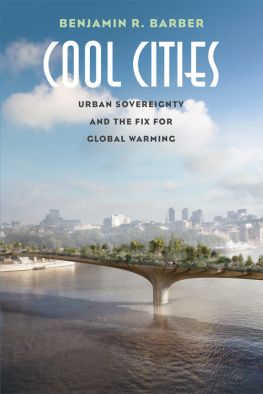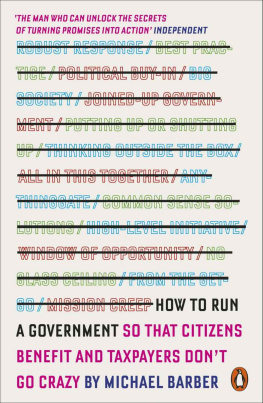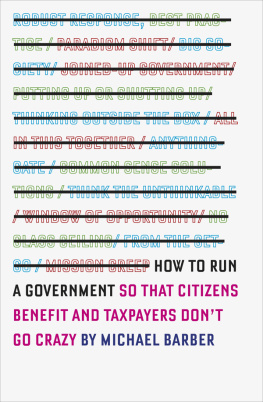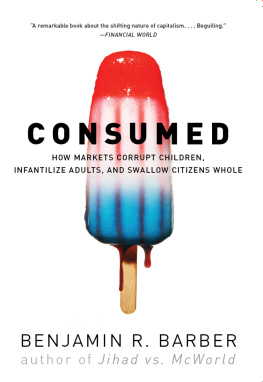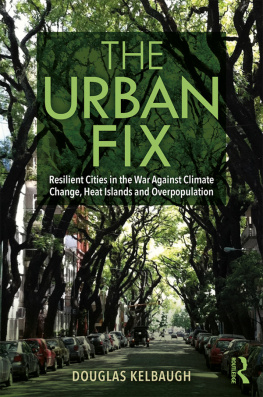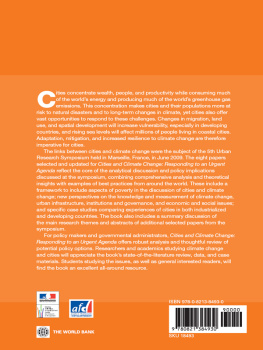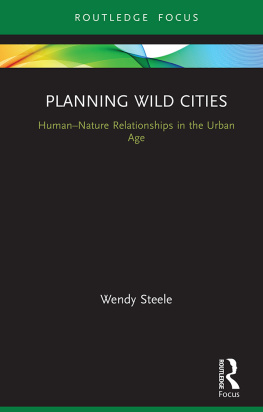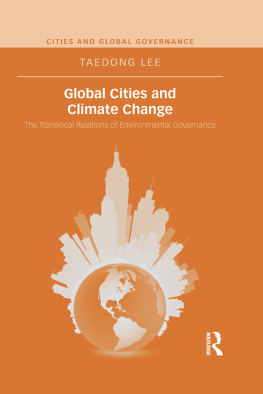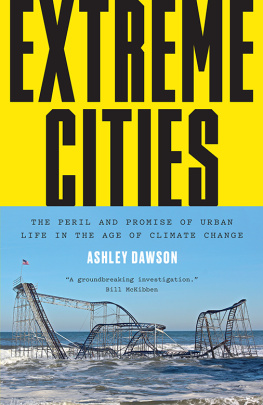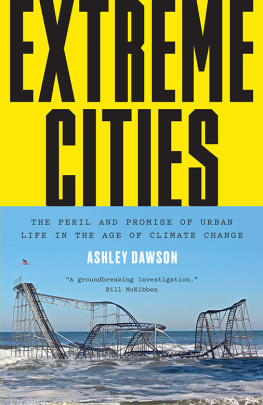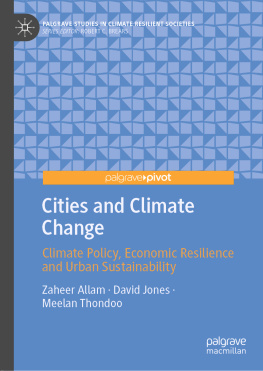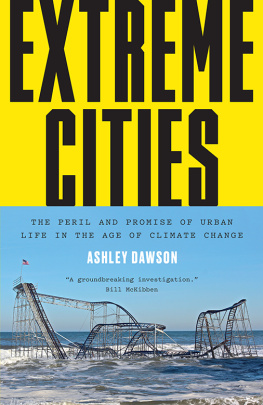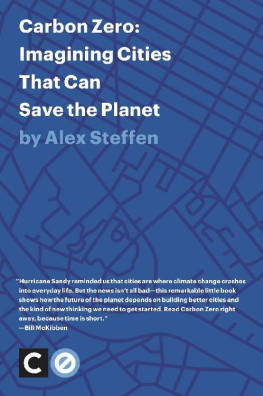Cool Cities
Also by Benjamin Barber
If Mayors Ruled the World: Dysfunctional Nations, Rising Cities (2013)
Consumed (2007)
Fears Empire (2003)
The Truth of Power (2001)
A Place for Us (1998)
A Passion for Democracy: American Essays (1998)
Jihad vs. McWorld (1995)
An Aristocracy of Everyone (1992)
The Conquest of Politics (1988)
Strong Democracy (1984)
Marriage Voices (A Novel) (1981)
Liberating Feminism (1975)
The Death of Communal Liberty (1974)
Superman and Common Men (1971)
In Collaboration
The Struggle for Democracy
with Patrick Watson (1989)
The Artist and Political Vision
edited with M. McGrath (1982)
Totalitarianism in Perspective
with C. J. Friedrich and M. Curtis (1969)

Published with assistance from the Louis Stern Memorial Fund.
Copyright 2017 by Benjamin R. Barber. All rights reserved. This book
may not be reproduced, in whole or in part, including illustrations, in
any form (beyond that copying permitted by Sections 107 and 108 of
the U.S. Copyright Law and except by reviewers for the public press),
without written permission from the publishers.
Yale University Press books may be purchased in quantity for educational,
business, or promotional use. For information, please e-mail
(U.K. office).
Set in Gotham type by IDS Infotech, Ltd. Printed in the United States
of America.
ISBN 978-0-300-22420-7
Library of Congress Control Number: 2016958783
A catalogue record for this book is available from the British Library.
This paper meets the requirements of ANSI/NISO Z39.48-1992
(Permanence of Paper).
10 9 8 7 6 5 4 3 2 1
To Leah Barber
I have long been conscious of the climate crisis and the political challenges it presents. But it is my wife Leahs deep moral commitment to action that has moved me from discussion and debate to action. A gifted dancer and choreographer, she has devoted recent years to taking the fight for climate action to the streets. She continues now to focus on both her art and civic action, at once an artist and a citizen. Shes a cool lady with a warm heart, an outsize conscience, and a crackling talent, and it is to her I joyfully dedicate this book.
It always seems impossible, until its done.
Nelson Mandela
Contents
Acknowledgments
This book is a kind of sequel to If Mayors Ruled the World in that it focuses the broad thesis of urban networking and political action on the specific crisis of climate change, whichas an existential threatoutweighs every other crisis we face. It was written during an extremely challenging period during which I have worked nonstop with a small team to bring a new global governance organization, the Global Parliament of Mayors, into being. A product of If Mayors Ruled the World, the GPM has leaned heavily on the hard work and good will of this team and on the generous support of a number of good-willed funders.
The GPM team has brought together a number of people who worked with me on the Interdependence Movement, and who remained engaged in the quest to give cities a meaningful role in global governance. These include Jackie Davis, director of the Lincoln Center Library of Performing Arts, who not only chaired the movements executive committee for many years but was always ready with counsel, funding support, and enthusiasm. My dear friend and fellow culture specialist and artist Eileen Haring Woods has been a longtime ally who gave us a year early in the mayors project as our executive director and then rejoined us to take the project to its realization in The Hague in September 2016. Working with us in New York and from her base in Suffolk, England, Eileen proved that cosmopolitanism is a state of mind rather than an address.
The GPM team in New York has featured a remarkable group of young professionals, including Dana Kroll, Nick Carney, Mihika Srivastava, Eric Emanuelson, and my very gifted and resourceful executive assistant and team coordinator Emilie Saccone, capable and responsible far beyond her years.
I have also had the benefit of important substantive conversations with members of the GPM advisory board, including Rob Muggah of the Igarap Institute, John Means of McKinsey and Company, Jochen Sandig of the Berlin Radialsystem Theater, Eric Corijn, director of the Brussels Institute, and my friend and colleague Emad Tinawi. I owe Mark Watts, executive director of the C40 Climate Cities, a special debt as a longtime climate activist from his days with the City of London and a contributor to our work on the GPM and to this book.
In 2016, when I was moving from the CUNY Graduate Center to Fordham University, CUNY provost Louise Lennihan was extraordinarily hospitable. Not only did she invite me to complete my visiting fellowship in the Provosts Office, she also enabled the Graduate Center to host temporarily a Society of Patrons, something that was enormously helpful to the founding of the Global Parliament of Mayors. Her friendship and collegiality are deeply appreciated, and the role of the Graduate Center in providing a home for the writing of this book are gratefully acknowledged.
My new colleague at Fordham University Law School, Sheila Foster, who established Fordhams new Urban Consortium of which I am now a research fellow and partner, represents the kind of commitment to urban justice and cities research that makes it an honor to be her colleague. I am grateful to be working with her and with Nestor Davidson and Karen Greenberg, who helped facilitate the Fordham relationship.
A group of generous foundations, by funding the preparatory research and planning for the Global Parliament of Mayors project as well as my ongoing cities research, also enabled me also to spend time on this book. These include Bloomberg Philanthropies (special thanks to Jim Anderson), the Nomis Foundation (special thanks to Heine Thyssen and Markus Reinhard), the Levitt Foundation (special thanks to Liz Levitt), and the Kettering Foundation (special thanks to David Matthews and my dear friend, former student, and able counselor John Dedrick).
Hans Joachim Schellnhuber, the Nobel laureate who runs the Potsdam Climate Institute and advises governments in Europe and North America on climate change, played a special role in the composition of this book. As a colleague and friend who keynoted our Berlin Interdependence Celebration and Forum in 2010, he invited Leah and me to an international Laureates Conference on climate change in Hong Kong in 2015. The paper I wrote for that meeting became the seed that germinated into this book. He is thus its original inspiration, and the book stands as a tribute to his global leadership in trying to bring the world to its senses on climate change.
Finally, the many mayors I have had the fortune to engage with on the way to founding the Global Parliament of Mayors have contributed directly to the themes and concerns of this book, and indirectly to the spirit of urban leadership the book represents. They include Mayor Jozias van Aartsen of The Hague, who took the needed leap of faith when he offered to host the inaugural GPM meeting, and his colleagues in the Dutch cities of Amsterdam (where with Mayor van der Laans hospitality we organized a key planning meeting of thirty cities in 2014), Rotterdam (where I proudly work with Mayor Aboutalebs International Advisory Board), and Utrecht (Mayor J. van Zanen). Rob van Gijzel, the former mayor of Eindhoven, Hollands design and technology leader, has also been an inspiration
Next page
